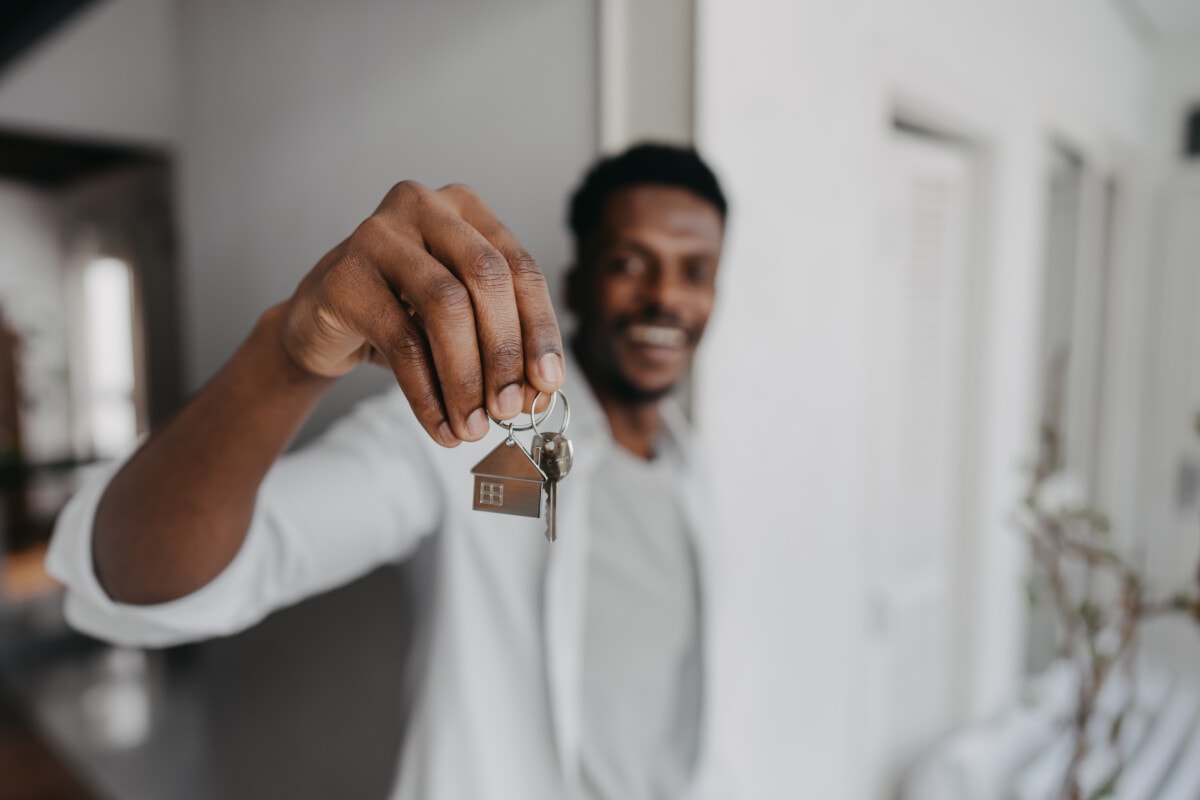If you think homeownership is out of reach just because you’re in your 20s, think again. Contrary to popular belief, buying real estate in your 20s is not only feasible but also a smart investment for your future. According to a Freddie Mac survey, over 85% of the younger members of Gen Z are eager to own a home and plan to do so by the age of 30, three years earlier than the average home buying age.
Don’t let student loans or entry-level salaries deter you, as there are ways to overcome these obstacles and make your first-time home buyer dreams a reality. In this Redfin article, we’ll guide you through the steps to navigate the real estate market, obtain a mortgage, and achieve that coveted first-time homebuyer status. Whether you’re moving to a new house in San Marcos, CA, or considering a condo in Orlando, FL, we’ll show you how to get closer to unlocking the door of your dream home sooner than you ever thought possible.

Get pre-approved and secure your dream home
Work with a lender to find the right loan for the home you love.
10 Tips to buying a house in your early 20s * NEED Bay Equity loan link
Get pre-approved and secure your dream home
Buying a house in your early 20s can be an exciting and rewarding milestone. To make the process smoother, follow these ten essential steps to homeownership:
Get pre-approved and secure your dream home
1. Save for a down payment
Saving for a down payment is a crucial step in buying a house in your early 20s. Lenders typically require a down payment, which is a percentage of the home’s purchase price. By saving diligently, you’ll be able to demonstrate financial responsibility to lenders and secure a more favorable home loan. A higher down payment can also help you avoid private mortgage insurance (PMI) and reduce your overall monthly mortgage payments.
For example, if you have a stable job and aspire to purchase a $200,000 starter home. You’d need to save $800 per month for two years to successfully reach your $19,200 down payment goal. With a 10% down payment, you could potentially secure a $180,000 mortgage.
2. Build your credit score
A strong credit score is essential when applying for a mortgage. Lenders use your credit score to assess your creditworthiness and determine the interest rate for your loan. To improve your credit score, pay your bills on time, keep credit card balances low, and avoid opening multiple new credit accounts. A higher credit score will increase your chances of getting approved for a mortgage with favorable terms.
3. Prioritize needs over wants
As a first time homebuyer, it’s crucial to prioritize your needs over wants when searching for a house that is affordable for you. Know what to look for when buying a house for the first time, such as location, number of bedrooms, and proximity to work or amenities that are essential to you. Be realistic about your budget and avoid stretching your finances to afford unnecessary luxuries. Remember that you can always upgrade or renovate later as your financial situation improves.
4. Assess your financial situation
Before diving into the homebuying process, take a comprehensive look at your financial situation. Consider your income, savings, existing debts, and monthly expenses. A clear understanding of your financial health will help you determine how much house you can afford and manage homeownership expenses effectively.
5. Plan for unexpected home expenses
Owning a home comes with unforeseen expenses, such as repairs, maintenance, and property taxes. As a responsible homeowner, it’s essential to have an emergency fund to cover these unexpected costs. This fund will provide a safety net and prevent financial strain when unforeseen issues arise.

7. Decide where and what you want to buy
Determine the location and type of property that aligns with your lifestyle and future plans. Research the real estate market in your desired area to understand property prices and trends. Consider the potential for future moves due to job changes or other life events like marriage. If you anticipate relocating, ensure the property would be easy to resell if needed. Determine your location preferences by asking questions about proximity to amenities, easy transportation, and suburban versus urban settings. While the house might not be your dream location, it could serve as a starter home with plans to upgrade later.
Additionally, decide on the type of property that suits you best, whether it’s a single-family home, condo, townhome, or tiny home, each with its associated costs and fees. A fixer-upper may be more affordable but requires renovation, while a move-in ready home may be costlier but demands fewer updates.
8. Assess your student loan debt
If you have student loan debt, evaluate how it fits into your overall financial picture. Consider the impact of your loan payments on your budget and ability to afford a mortgage. Explore loan forgiveness or repayment options that may help reduce your monthly student loan burden and free up funds for homeownership.
Additionally, many states offer housing assistance programs for first-time homebuyers, or buyers who meet other program requirements, providing low-interest mortgages or down payment assistance to those eligible. Speaking with a mortgage lender can help you explore whether you qualify for such programs.
9. Calculate your debt-to-income (DTI) ratio
The debt-to-income (DTI) ratio is a crucial financial metric that lenders use to assess your ability to manage a mortgage. It compares your monthly debt obligations to your gross monthly income. To calculate your DTI ratio, add up all your monthly debt payments, including student loans, car loans, credit card payments, and potential mortgage payments. Then, divide that total by your gross monthly income (income before taxes and deductions).
For example, if your total monthly debt payments are $1,500, and your gross monthly income is $5,000, your DTI ratio would look like this:
DTI Ratio = ($1,500 / $5,000) * 100 = 30%
A lower DTI ratio is generally more favorable, as it indicates that you have a more manageable level of debt relative to your income. By keeping your DTI ratio within the lender’s preferred range, you’ll have a better chance of qualifying for a mortgage and securing more favorable terms. If your DTI ratio is on the higher side, consider strategies like paying off existing debts or increasing your income to improve your financial standing before applying for a mortgage.
9. Assess your career progression
Evaluating your career trajectory is an essential step before buying a house in your early 20s. Consider your job stability, growth opportunities, and earning potential. Since homeownership is a long-term commitment, having a steady and promising career can provide the financial stability needed to meet mortgage obligations and maintain homeownership.
Assess whether your current job aligns with your long-term goals and if it offers the potential for increased income and career advancement, which can positively impact your ability to manage homeownership expenses in the future.
10. Purchase a starter home
When buying a house in your early 20s, consider opting for a starter home as your first property. A starter home is typically more affordable and smaller than your forever home, making it a practical choice for homebuyers with limited budgets. This approach allows you to build equity and gain homeownership experience while keeping costs manageable. As your financial situation improves over time, you can consider upgrading to a larger or more permanent home that aligns with your changing needs and preferences. Remember that a starter home can be a stepping stone towards achieving your real estate goals and building a strong foundation for future property investments.

Pros and cons to buying a house in your 20s
Benefits of buying a house in your 20s
Tax benefits
Homeownership often comes with tax advantages, such as deducting mortgage interest and property taxes from your taxable income. These tax benefits can help you save money and potentially lower your overall tax liability.
Consistent payments
Owning a home allows you to lock in a fixed-rate mortgage, providing stability in monthly housing payments. Unlike renting, where landlords may increase rent over time, having a consistent mortgage payment can make budgeting and financial planning more manageable.
Customize your property
As a homeowner, you have the freedom to personalize your living space to suit your tastes and lifestyle. Whether it’s painting the walls, remodeling the kitchen, or creating a backyard oasis, customization options are in your hands.
Investment
Real estate has the potential to appreciate over time, building equity in your property. By purchasing a home in your 20s, you have the advantage of starting your investment journey early, which can yield significant returns over the years.
Drawbacks of buying a house in your 20s
Needs may change
In your 20s, life may change rapidly. Job opportunities, relationships, or lifestyle preferences may prompt you to move to a different city or region, making it challenging to commit to a home in one place for an extended period.
Maintenance and upkeep
Homeownership comes with ongoing responsibilities and costs for repairs and maintenance. Unexpected expenses for repairs can strain your budget, especially if you have limited savings as a young homeowner.

FAQs to buying a house in your early 20s
1. Is it a good idea to buy a house in my early 20s, or should I wait until I’m older?
The decision to buy a house in your early 20s depends on your individual financial situation, long-term goals, and personal preferences. While it offers the advantage of building equity early and potential tax benefits, consider factors like job stability and whether you plan to settle in the area for a few years. Weigh the pros and cons and consider meeting with a financial advisor before making a decision.
2. How much money do I need for a down payment on a house?
The down payment requirement varies depending on the type of mortgage and the lender’s criteria. Conventional mortgages typically require a down payment of 3% to 20% of the home’s purchase price. FHA loans may require as little as 3.5% down, while VA loans offer zero down payment options for eligible veterans. It’s best to aim for a higher down payment to secure better mortgage terms and avoid private mortgage insurance (PMI).
3. Can I qualify for a mortgage with student loan debt?
Yes, it’s possible to qualify for a mortgage with student loan debt. Lenders will assess your debt-to-income (DTI) ratio, credit score, and overall financial health to determine your eligibility. Managing your student loan payments responsibly and improving your credit score can positively impact your chances of obtaining a mortgage.
4. What are the additional costs associated with buying a house?
In addition to the down payment and monthly mortgage payments, homebuyers should budget for closing costs, which typically range from 2% to 5% of the home’s purchase price. Other expenses include property taxes, homeowners insurance, and potential homeowner association (HOA) fees. Additionally, factor in costs for moving, home inspections, and initial furnishings.
5. Should I consider buying a fixer-upper as my first home?
Buying a fixer-upper can be an attractive option for some first time homebuyers looking to save on the initial purchase price and personalize their home. However, it also comes with risks and potential hidden costs. Consider your renovation skills, budget, and the extent of repairs needed before deciding on a fixer-upper. It’s essential to conduct a thorough home inspection and understand the renovation costs involved.




















 United States
United States Canada
Canada